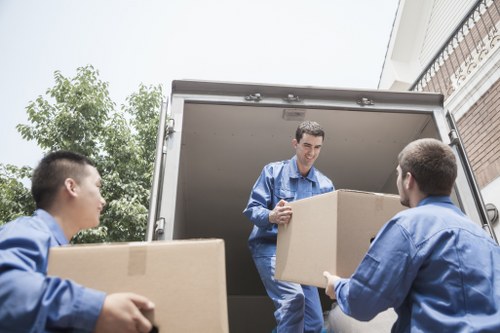Comprehensive Guide to Council Waste Collection in Tunbridge Wells

Introduction to Waste Collection Services
Managing waste effectively is crucial for maintaining the cleanliness and hygiene of Tunbridge Wells. The council waste collection services are designed to ensure that residents have access to regular and reliable waste disposal options. Understanding how these services work can help residents contribute to a cleaner environment.
The waste collection schedule varies depending on the type of waste and the area within Tunbridge Wells. It's important for residents to be aware of their specific collection days to avoid any inconvenience.
Additionally, the council offers recycling services to promote sustainability. By separating recyclable materials from general waste, Tunbridge Wells is taking a significant step towards reducing its environmental footprint.

Types of Waste Collected
General Household Waste
General household waste includes everyday items that are no longer needed or wanted. This includes non-recyclable plastics, food waste, and other miscellaneous items. It's essential to place this waste in the designated bins to ensure efficient collection.
Recyclable Materials
Recyclable materials such as paper, cardboard, glass bottles, and certain plastics are collected separately. The council provides specific bins for recyclables, making it easier for residents to sort their waste correctly.
Garden Waste
Garden waste, including leaves, branches, and grass clippings, is also collected by the council. This type of waste requires special handling to ensure it doesn't clog the waste management system.

Waste Collection Schedule
The waste collection schedule is meticulously planned to cover all areas of Tunbridge Wells. Typically, general waste is collected once a week, while recycling and garden waste may have different collection frequencies.
Residents can check their specific collection days by visiting the council's official website or contacting the local waste management office. Staying informed about the schedule helps in organizing waste disposal effectively.
During public holidays or unforeseen events, the collection schedule may be adjusted. The council usually provides notifications in such cases to keep residents updated.

Recycling Initiatives
Recycling plays a pivotal role in Tunbridge Wells' waste management strategy. The council encourages residents to sort their waste properly to ensure that recyclable materials are processed efficiently.
Types of Recyclables
- Paper and Cardboard
- Glass Bottles and Jars
- Plastics Marked with Recycling Symbols
- Metal Cans and Containers
By separating these materials, the council can recycle them into new products, reducing the need for raw materials and minimizing environmental impact.

Special Waste Collection Services
In addition to regular waste collection, Tunbridge Wells council offers special services for hazardous and bulky waste. Items such as electronics, batteries, and furniture require careful handling to prevent environmental contamination.
Hazardous Waste
Hazardous waste includes chemicals, paints, and other dangerous materials. The council provides designated drop-off points where residents can safely dispose of these items.
Bulky Waste
Bulky waste refers to large items like furniture, mattresses, and appliances. Residents can arrange for a special collection by contacting the council, ensuring these items are removed without disrupting regular waste services.
How to Prepare Your Waste for Collection
Proper preparation of waste ensures smooth and efficient collection. Here are some guidelines to follow:
- Sort Your Waste: Separate recyclables from general waste.
- Bag Your Trash: Use appropriate bags for general waste and avoid overfilling bins.
- Secure Your Bins: Ensure that lids are closed to prevent spillage and discourage pests.
- Place Bins Correctly: Position your bins at the designated collection point on the scheduled day.
By following these steps, residents can contribute to an organized and efficient waste collection process.
Penalties for Non-Compliance
The council enforces strict regulations to maintain waste management standards. Non-compliance can lead to penalties such as fines or suspension of waste collection services.
Common Violations
- Missed Collection Days
- Improper Waste Separation
- Illegal Dumping
- Failure to Secure Bins
It's essential for residents to adhere to the guidelines to avoid these penalties and ensure a clean community.
Environmental Impact of Effective Waste Collection
Effective waste collection has significant environmental benefits. It reduces pollution, conserves natural resources, and minimizes the spread of diseases.
Pollution Reduction
Proper waste disposal prevents toxic substances from entering the soil and water, protecting ecosystems and public health.
Resource Conservation
Recycling conserves natural resources by reprocessing materials, reducing the need for raw material extraction.
Public Health
Maintaining clean neighborhoods reduces the risk of disease transmission and improves overall community well-being.
Community Engagement and Education
The council plays an active role in educating residents about responsible waste management. Community workshops, informational campaigns, and school programs are some of the initiatives undertaken.
Workshops and Seminars
These events provide valuable information on recycling techniques, composting, and reducing household waste. They also offer practical tips for effective waste management.
Informational Campaigns
Periodic campaigns raise awareness about the importance of proper waste disposal and encourage community participation in recycling programs.
School Programs
Engaging students in waste management education fosters a culture of sustainability from a young age.
Innovations in Waste Management
Tunbridge Wells is embracing innovative technologies to enhance waste collection efficiency. From smart bins to advanced recycling facilities, these innovations aim to streamline operations and reduce environmental impact.
Smart Bins
Equipped with sensors, smart bins notify the council when they are full, ensuring timely collection and preventing overflow.
Advanced Recycling Facilities
Modern recycling plants utilize state-of-the-art technology to sort and process materials more effectively, increasing recycling rates and reducing landfill usage.
Composting Programs
Community composting initiatives convert organic waste into valuable compost, promoting soil health and reducing greenhouse gas emissions.
10-15 Closest Areas to Tunbridge Wells
Understanding the proximity of neighboring areas to Tunbridge Wells is essential for residents who may utilize waste collection services in these locales. Here are some of the closest areas:
- Ashurst Green: Located just north of Tunbridge Wells, Ashurst Green offers convenient access to waste collection services with minimal travel time.
- Benenden: Situated to the southwest, Benenden is known for its residential neighborhoods and efficient waste management routines.
- Clare Hall: To the east, Clare Hall provides robust waste collection services, ensuring the community remains clean and organized.
- Haysden Green: Northwest of Tunbridge Wells, Haysden Green benefits from the council's comprehensive recycling programs.
- Pellett: Located near the town center, Pellett is central to waste collection routes, facilitating easy access for residents.
- Platt: On the outskirts, Platt enjoys scheduled waste collections that align with the town's broader environmental goals.
- Southborough: South of Tunbridge Wells, Southborough integrates seamlessly with the main waste management system.
- Speldhurst: East of the town, Speldhurst upholds high standards in waste disposal and recycling practices.
- Tantallon: Adjacent to the west, Tantallon ensures timely waste collection, maintaining the area's cleanliness.
- Uckfield: While slightly further, Uckfield collaborates closely with Tunbridge Wells for efficient waste management.
- West Hoathly: To the northwest, West Hoathly leverages the council's waste collection services for a cleaner environment.
- Withyham: South-central, Withyham benefits from regular waste pickups and recycling initiatives.
- Crowborough: Northeast of Tunbridge Wells, Crowborough engages in sustainable waste practices in partnership with the council.
- Limpsfield: On the southern fringe, Limpsfield coordinates waste collection schedules with Tunbridge Wells for seamless service.
Each of these areas contributes to the overall waste management efficiency in and around Tunbridge Wells, ensuring that all residents have access to reliable and effective waste collection services.
Benefits of Using Council Waste Collection
Opting for council waste collection offers numerous advantages to both residents and the environment. Here are some key benefits:
Cost-Effective
Council waste services are often more affordable compared to private waste collection companies, making them a budget-friendly option for households.
Reliability
The council ensures that waste is collected regularly and punctually, reducing the risk of overflow and associated issues.
Environmental Responsibility
By participating in council recycling programs, residents contribute to broader environmental conservation efforts, promoting sustainability in the community.
Convenience
With designated collection points and scheduled pickups, managing waste becomes a hassle-free process for residents.
Challenges in Waste Management
Despite the benefits, waste management in Tunbridge Wells faces several challenges. Addressing these issues is crucial for maintaining an effective waste collection system.
Increasing Waste Volumes
The growing population leads to higher waste production, putting pressure on existing waste collection infrastructure.
Recycling Contamination
Improper sorting of recyclables can contaminate the entire batch, making recycling efforts less effective and more costly.
Illegal Dumping
Unauthorized dumping of waste poses environmental hazards and undermines the council's waste management initiatives.
Resource Limitations
Limited financial and human resources can hinder the expansion and improvement of waste collection services.
Future Prospects and Improvements
The council is continuously exploring ways to enhance waste collection services in Tunbridge Wells. Future plans include adopting new technologies, expanding recycling programs, and increasing community engagement.
Adoption of Green Technologies
Implementing eco-friendly technologies can streamline waste collection processes and reduce environmental impact.
Expansion of Recycling Programs
Introducing more comprehensive recycling options will encourage greater participation and improve overall recycling rates.
Enhanced Community Participation
Engaging residents through awareness campaigns and educational programs will foster a culture of responsible waste management.
Conclusion
Council waste collection in Tunbridge Wells is a vital service that plays a significant role in maintaining the town's cleanliness and sustainability. By understanding the various aspects of waste management, residents can actively participate in creating a healthier and more environmentally friendly community.
Through effective scheduling, recycling initiatives, and community engagement, Tunbridge Wells sets a commendable example in waste management practices. Continued efforts and improvements will ensure that the town remains clean, green, and resilient against future challenges.
Frequently Asked Questions
1. How can I find out my waste collection days in Tunbridge Wells?
You can find your specific waste collection days by visiting the Tunbridge Wells council website or contacting their waste management office. Additionally, many residents receive a waste collection calendar upon moving into the area.
2. What items are not accepted in the general waste collection?
Items such as hazardous waste, electronics, large furniture, and certain plastics marked with recycling symbols should not be placed in general waste bins. These items require special disposal methods and should be taken to designated drop-off points.
3. How often is recycling collected in Tunbridge Wells?
Recycling collection schedules may vary by area, but generally, recycling is collected once a week. It's recommended to check the specific schedule for your locality on the council's website.
4. What should I do with bulky waste items like old furniture?
Bulky waste items should be scheduled for a special collection by contacting the council. Alternatively, you can bring them to designated collection points if available.
5. Are there any penalties for not complying with waste collection guidelines?
Yes, the council enforces penalties for non-compliance, which may include fines or suspension of waste collection services. It's important to adhere to the guidelines to avoid these consequences.